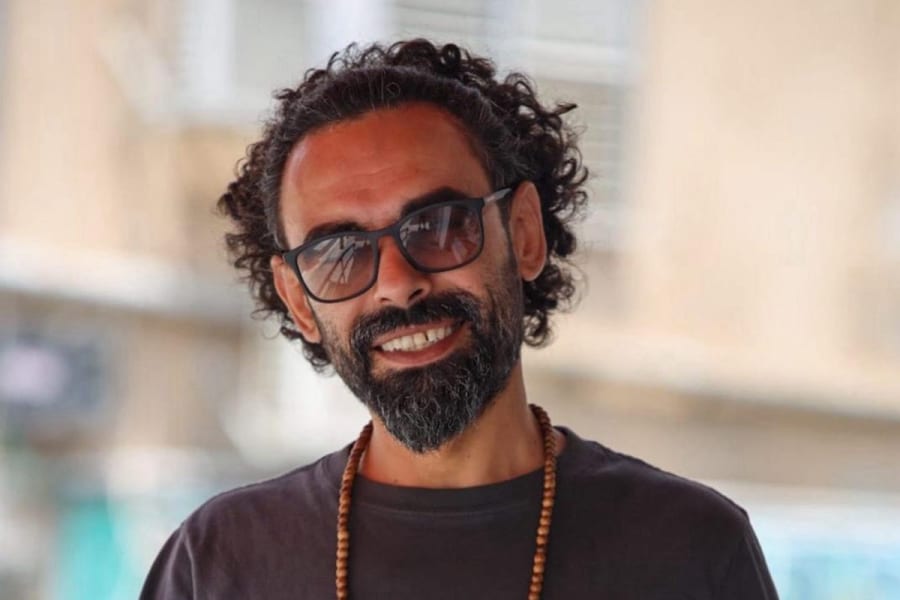The voice of Arab-Israeli Ali Shaaban and the power of his simple, 'subversive' message in support of Israel

Ali Shaaban, an Arab-Israeli husband and father from the north of Israel, has been causing a stir. He has publicly declared his love for his country and called for peace and understanding, breaking social taboos in his community.
Shaaban first began speaking out in 2014, “anywhere someone was willing to listen,” and slowly more people have been hearing what he has to say. He is now becoming a well-known and well-loved voice.
In this exclusive interview with ALL ISRAEL NEWS, Shaaban explains how he came to love Israel, what response he has had to his messages, and his thoughts about the future for Jews and Arabs in this land.
ALL ISRAEL NEWS: Can you tell us a bit about your background, your family, and how you grew up?
Shaaban: I was born in the city of Nazareth in 1984, to a traditional Arab-Muslim family. The city I grew up in was wrapped in strict codes of honor, hierarchy, and at times – fear. The community around me was mostly conservative, with rigid internal rules: what could be said, what must never be asked, and who should never be listened to.
It was a space that shaped a very clear collective identity – we are the victims, they are the invaders. The Palestinian identity was not just a national one, but also a religious, social, and at times almost existential feeling. We learned history through a single lens: one of suffering, displacement, betrayal by the world, and hatred toward a state that was seen as illegitimate. It wasn’t just a story – it was a carved-in-stone truth, not to be questioned.
Over time crept a feeling that “something doesn’t add up.” Maybe it started when I first met Jewish friends. Maybe it deepened when I made the decision to enlist in the IDF – a nearly unthinkable decision in my environment. Military service exposed me not only to Jewish society, but also to the complexity of the reality on the ground, to stories we were never told at home, and to people who were the complete opposite of what I had been taught to believe.
From that moment began a process within me that still hasn’t ended – a process of deconstruction and rebuilding: deconstructing conventions, dismantling narratives that had seemed sacred, and asking questions I was never allowed to ask. In their place, I began building a new kind of awareness. One that denies no part of my identity, but also doesn’t blindly accept everything I was told. The awareness of a person searching for truth, even if it’s complicated. The awareness of a citizen in a country that didn’t always understand him – but which he chose to try to understand.
Today, I’m a sound technician, music teacher, music producer, orthopedic insole technician, and a social content creator aiming to open new dialogue between Jews and Arabs. I live in the Galilee, I’m married and a father, connected to tradition – but not blind to it. I’m not strictly religious, but my faith runs deep – faith in God, and in people. Faith that there is another way to live here – without giving up any part of who I am.
ALL ISRAEL NEWS: What made you want to start speaking publicly, and what message did you want to convey?
Shaaban: The decision to start speaking publicly wasn’t a single, sharp moment – it was a process. A process born out of an internal collision between two worlds I lived within. On one side, the Arab and Palestinian identity I was raised into – with all its historical weight, pain, and the constant feeling of being marginalized. And on the other side, my actual life in the State of Israel: my military service, my Jewish friends, the exposure to Jewish culture and the history of the Jewish people – all of these sparked deep questions in me about justice, belonging, and historical truth.
The more I delved into it, the more I understood that the existing discourse blocks any real path to reconciliation. It is built on fears, denials, and mutual accusations – not on listening and mutual recognition. I felt I had to break the silence, to stop fearing what people might say, and to offer a different voice – the voice of someone who believes that one can be both Arab and a loyal citizen of the state, without giving up one’s identity, but also without hating the other.
My message is simple, yet subversive: the Jews are not strangers here. They are not colonizers and not invaders. They are an ancient people who returned home – just as we feel this land is ours. If we cannot recognize this, we cannot move forward. And I say this not out of surrender, but out of responsibility.
ALL ISRAEL NEWS: What kind of response have you received?
Shaaban: The responses I received were like a mirror reflecting our society: on one hand, overwhelming support – from Jews surprised by this new Arab voice, and from young Arabs who felt relief that someone was finally saying out loud what they quietly feel in their hearts. I received letters, messages, hugs in the street – and most of all, pleas: “Keep going, you’re speaking for all of us.”
But alongside those came other reactions – more painful ones. Attacks, insults, slander, especially from people within the Arab community who feel that I’m “crossing lines” or dismissing Palestinian suffering. There were difficult moments, but each such reaction only highlighted how stuck our discourse is – and how desperately it needs a real shake-up.
ALL ISRAEL NEWS: How many Israeli Arabs do you think share your worldview?
Shaaban: In my opinion – quite a lot. I feel it in private conversations, in anonymous messages, in looks of silent solidarity. There is an entire public of Arabs in Israel – and even among Palestinians in the West Bank – who are tired of the cycle of violence and the lack of hope. They don’t want to raise a white flag – they just want to live. With dignity. With security. With a future. But they remain silent. Because in our society, independent thinking comes with a heavy price. Because questioning the narrative you were raised on – is almost considered betrayal. But I believe that once people see there is another way – they will join. Slowly, but surely.
ALL ISRAEL NEWS: Do you experience discrimination in Israel? Is there anything that frustrates you?
Shaaban: Personally, since I enlisted in the IDF and integrated into Israeli society, I feel like an equal citizen. I work alongside Jews, live with them, create with them, and have close friends from all sectors. I’ve never felt that anyone looked down on me. But that’s not everyone’s reality. Discrimination does exist – especially toward those living in isolated Arab villages and towns, who don’t serve, and who aren’t truly part of the Israeli civic and social sphere. They don’t interact with Jews in their daily lives, and they don’t feel a sense of belonging to the state. And that’s frustrating – because many of them are talented, good people who have simply lost faith. What angers me at times is that people do want to get closer – but there just aren’t enough bridges to make it happen. Not from the system, and not from their own society. I believe that change must come from both sides.
ALL ISRAEL NEWS: What would you like the Western world to know?
Shaaban: That the reality here is not a story of “good guys vs. bad guys. It’s not “oppressor vs. oppressed” or “victim vs. villain.” It’s the story of two peoples, each carrying pain, memory, and a longing for home. The Jewish people didn’t just land here by chance – they returned to the place where their identity, religion, language, and dreams were born. And the Palestinian people – they too are not merely victims, but a people seeking their place in a changing world.
The Western world often views the conflict through a colonial lens – but that view is mistaken. This isn’t just about land – it’s about identity, belonging, and the future. I believe that if we shift the conversation from “who’s right” to “how can we live together,” we can begin to write a new story – a story of reconciliation, not denial. It’s also important for me to clarify to the Western world that inside the State of Israel, Jews and Arabs already live side by side – working together, studying together, healing together in the same hospitals, and even serving together in parliament. The living conditions of Arab citizens of Israel are among the best in the Arab world – including freedom of religion, civil rights, access to education and higher learning, and advanced healthcare services.
And this isn’t merely a matter of material benefit – it’s evidence that coexistence is possible, and in fact, is already happening.
The real conflict is not between Jews and Arabs within Israel – it is with a Palestinian leadership that refuses to recognize the legitimacy of the State of Israel and the right of the Jewish people to return to their historical homeland. This is not a question of 1967 borders or technical solutions – it’s a question of recognition. As long as generations of children are taught that Jews are “foreigners” and “occupiers,” no true partnership can ever emerge.
I want the world to stop judging Israel through Western lenses and start listening to the real complexity of our story. A story where there is room for two peoples – if only they are willing to recognize each other. If the world truly wants to understand and help – it must stop projecting Europe’s colonial past onto the Middle East, and begin listening to our complex reality, face to face.
ALL ISRAEL NEWS: Shaaban’s last word on the subject?
Shaaban: Peace.

Jo Elizabeth has a great interest in politics and cultural developments, studying Social Policy for her first degree and gaining a Masters in Jewish Philosophy from Haifa University, but she loves to write about the Bible and its primary subject, the God of Israel. As a writer, Jo spends her time between the UK and Jerusalem, Israel.
You might also like to read this:
















